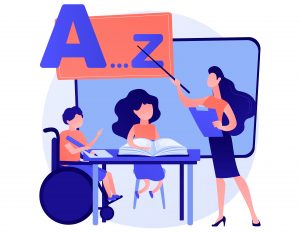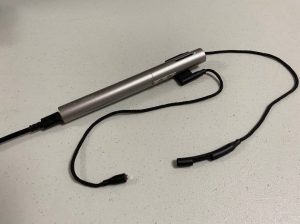
Nicolette, now 20, was diagnosed with Hearing Impairment (HI) when she was two years old. She went through her entire education dealing with the difficulties that come with being hearing impaired.
Special Educational Needs (SEN) students like Nicolette face many struggles in school that the mainstream population like you and I don’t know or understand about.
As a result, they might not have equal opportunities to learn and receive their education.
What can we do to support these SEN students better?
In this article, we spoke to Nicolette who shared with us about her journey, in hopes to raise awareness of what SEN students go through and what can be improved for them.
The 3 Types of Education

Firstly, let’s go through the different types of education for special needs students, to have a better understanding of the current context.
1. Special Needs Education
In Special Needs Education, the school consists of all or mostly students with SEN and the teachers are usually trained to cater for the needs of these students.
2. Integrated Education
This is where SEN students go to mainstream schools but they need to make huge adjustments to adapt to the environment which is often not catered for them at all.
For example, a Deaf student who uses sign language as the main mode of communication will not have funding for a Sign Language translator in an Integrated Education school.
3. Inclusive Education
This is the ideal environment where the school, policies, curriculum and culture are fitted to accommodate everyone’s needs as much as possible.
This allows SEN students to be able to fully participate in school life with non-SEN students and enhance their experience while maximising their potential.
–
Having lived as a HI student all her life, Nicolette has experienced the different types of education with different levels of support for SEN students.
She shares the experiences that she faced from when she was in primary school to polytechnic (poly).
Primary School

Nicolette attended a primary school with Integrated Education. She was the only hearing-impaired student in the school and had a hard time adapting to the school environment.
“I often felt very lost in classes and could not socialise as well as my peers,” said Nicolette. “I felt outcasted.”
There was only one special needs counsellor in the school, so Nicolette did not receive much assistance. There weren’t follow-up sessions.
“I understand the manpower restraint, thus there should be more support for special needs students, especially in mainstream schools,” said Nicolette.
More SEN students have been joining mainstream schools with the potential of flourishing in the environment if there is Inclusive Education for them.
This is evident in how the Singapore School for the Deaf shut down due to low enrolment over the years, as many of these students are able to fully participate in mainstream schools with some accommodations.
Secondary School

Nicolette’s secondary school had an inclusive education for HI students, being well-prepared and well-equipped.
They dedicated teachers to give HI students extra coaching as a form of support and check-ins. However, most of the time, the HI students are in the same classrooms as their abled peers.
“This gives us the opportunity to reach our potential with some support given,” said Nicolette. “I thrived very well in this environment and saw great improvements in my grades.”
Polytechnic
In Nicolette’s first year in a polytechnic, there were no SEN counsellors. She requested a Roger Pen (a device that helps her to hear lecturers better, as seen in the image above) a few weeks before school started, but the request was only fully processed halfway into her first semester.
Without the Roger Pen, Nicolette needed more effort to listen in her lessons.
“It can be tiring trying to listen the whole day,” said Nicolette.
However, to her delight, two SEN counsellors joined the poly over the years, which she felt was a great improvement.
“Most of the teachers I have met in poly have been supportive and understanding about my needs,” said Nicolette.
There was a lecturer who looked up the most affordable captioning service to caption one of the videos for Nicolette, which made her feel very touched.
“My teachers will gladly provide the support I need,” said Nicolette. “I believe that they are more focused on delivering the content that they want to teach to the students, and rather than focusing on the student’s weaknesses, they focus on the student’s strengths instead.”
In 2021, Nicolette, along with a few other students, was determined to make an impact and create an inclusive and supportive community for SEN students in the polytechnic. They proposed to create a new CCA that centered around SEN students, and it was approved by the school in about five months.
They are now continuing to run this CCA to spread awareness and build a stronger sense of community for the SEN students in the school.
Do Special Needs Students Require Tuition?

With some of their physical or intellectual limitations, many special needs students struggle with catching up with the mainstream style of teaching in classrooms.
As such, tuition can be a great aid in allowing a special needs student to receive more help and attention.
“Tuition offers the unique experience of having one-to-one lessons or small groups which allows tutors to give their full attention to the student to provide guidance,” says Nicolette. “They may help the student to be able to reach their full potential as teachers in school may be too busy or overloaded with work.”
Advice for Tutors Teaching Special Needs Students

Nicolette would like to highlight that her experience does not speak for all SEN students. There are many different types of special needs that can bring about different experiences.
For example, students with intellectual or social behavioural disabilities may appear unfocused and unmotivated and tutors might feel discouraged or find difficulties in teaching them.
As it’s not always easy for SEN students to speak out, tutors should make the effort to actively communicate with their SEN students.
Ask them what they need and accommodate their needs. If it is not possible for the tutor to provide all the accommodations, there should be communication to find a middle ground.
Nicolette also advises tutors to be more patient, kind, and understanding to SEN students.
Conclusion

“I hope that MOE and all schools in Singapore can work on creating a truly inclusive education… to allow for all students to be able to fully participate and achieve their full potential,” said Nicolette.
Although support for special needs students is making improvements in Singapore, there is definitely more that can be done to bridge the learning gap, so that SEN students can be accommodated in their education!

